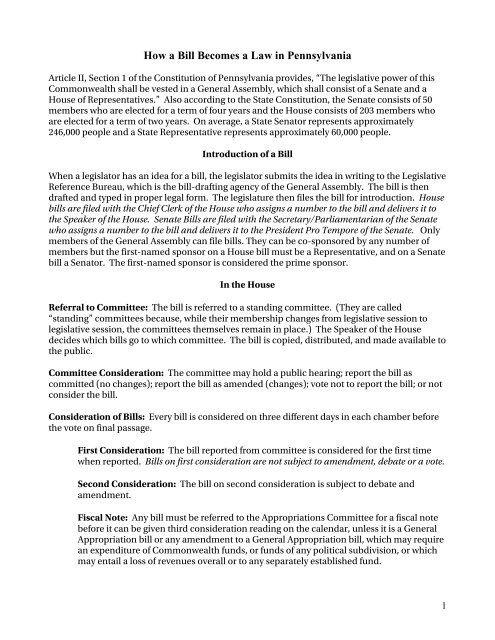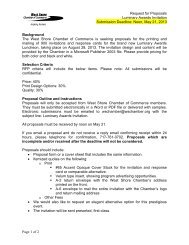How a Bill Becomes a Law in Pennsylvania - West Shore Chamber ...
How a Bill Becomes a Law in Pennsylvania - West Shore Chamber ...
How a Bill Becomes a Law in Pennsylvania - West Shore Chamber ...
Create successful ePaper yourself
Turn your PDF publications into a flip-book with our unique Google optimized e-Paper software.
<strong>How</strong> a <strong>Bill</strong> <strong>Becomes</strong> a <strong>Law</strong> <strong>in</strong> <strong>Pennsylvania</strong><br />
Article II, Section 1 of the Constitution of <strong>Pennsylvania</strong> provides, “The legislative power of this<br />
Commonwealth shall be vested <strong>in</strong> a General Assembly, which shall consist of a Senate and a<br />
House of Representatives.” Also accord<strong>in</strong>g to the State Constitution, the Senate consists of 50<br />
members who are elected for a term of four years and the House consists of 203 members who<br />
are elected for a term of two years. On average, a State Senator represents approximately<br />
246,000 people and a State Representative represents approximately 60,000 people.<br />
Introduction of a <strong>Bill</strong><br />
When a legislator has an idea for a bill, the legislator submits the idea <strong>in</strong> writ<strong>in</strong>g to the Legislative<br />
Reference Bureau, which is the bill-draft<strong>in</strong>g agency of the General Assembly. The bill is then<br />
drafted and typed <strong>in</strong> proper legal form. The legislature then files the bill for <strong>in</strong>troduction. House<br />
bills are filed with the Chief Clerk of the House who assigns a number to the bill and delivers it to<br />
the Speaker of the House. Senate <strong>Bill</strong>s are filed with the Secretary/Parliamentarian of the Senate<br />
who assigns a number to the bill and delivers it to the President Pro Tempore of the Senate. Only<br />
members of the General Assembly can file bills. They can be co-sponsored by any number of<br />
members but the first-named sponsor on a House bill must be a Representative, and on a Senate<br />
bill a Senator. The first-named sponsor is considered the prime sponsor.<br />
In the House<br />
Referral to Committee: The bill is referred to a stand<strong>in</strong>g committee. (They are called<br />
“stand<strong>in</strong>g” committees because, while their membership changes from legislative session to<br />
legislative session, the committees themselves rema<strong>in</strong> <strong>in</strong> place.) The Speaker of the House<br />
decides which bills go to which committee. The bill is copied, distributed, and made available to<br />
the public.<br />
Committee Consideration: The committee may hold a public hear<strong>in</strong>g; report the bill as<br />
committed (no changes); report the bill as amended (changes); vote not to report the bill; or not<br />
consider the bill.<br />
Consideration of <strong>Bill</strong>s: Every bill is considered on three different days <strong>in</strong> each chamber before<br />
the vote on f<strong>in</strong>al passage.<br />
First Consideration: The bill reported from committee is considered for the first time<br />
when reported. <strong>Bill</strong>s on first consideration are not subject to amendment, debate or a vote.<br />
Second Consideration: The bill on second consideration is subject to debate and<br />
amendment.<br />
Fiscal Note: Any bill must be referred to the Appropriations Committee for a fiscal note<br />
before it can be given third consideration read<strong>in</strong>g on the calendar, unless it is a General<br />
Appropriation bill or any amendment to a General Appropriation bill, which may require<br />
an expenditure of Commonwealth funds, or funds of any political subdivision, or which<br />
may entail a loss of revenues overall or to any separately established fund.<br />
1
Third Consideration and F<strong>in</strong>al Passage: The bill on third consideration is considered <strong>in</strong><br />
its calendar order. In the House, the bill is subject to debate, but it is subject to<br />
amendment only when an amendment is necessary to make the document <strong>in</strong>ternally<br />
consistent, to clear up an ambiguity, to correct grammar, to correct a draft<strong>in</strong>g error, or is<br />
necessary for purposes of statutory construction. In the House of Representatives, 102<br />
votes are required for f<strong>in</strong>al passage.<br />
In the Senate<br />
Referral to Committee: The Secretary of the Senate receives the bill from the House. The<br />
President Pro Tempore refers it to a stand<strong>in</strong>g committee.<br />
Committee Consideration: The committee may hold a public hear<strong>in</strong>g; report the bill as<br />
committed (no changes); report the bill as amended (changes); vote not to report the bill; or not<br />
consider the bill.<br />
Consideration of <strong>Bill</strong>s: Every bill is considered on three different days <strong>in</strong> each chamber before<br />
the vote on f<strong>in</strong>al passage.<br />
First Consideration: The bill reported from committee is considered for the first time<br />
when reported. <strong>Bill</strong>s on first consideration are not subject to amendment, debate or a vote.<br />
Second Consideration: The bill on second consideration is subject to debate and<br />
amendment.<br />
Fiscal Note: Any bill must be referred to the Appropriations Committee for a fiscal note<br />
before it can be given third consideration read<strong>in</strong>g on the calendar, unless it is a General<br />
Appropriation bill or any amendment to a General Appropriation bill, which may require<br />
an expenditure of Commonwealth funds, or funds of any political subdivision, or which<br />
may entail a loss of revenues overall or to any separately established fund.<br />
Third Consideration and F<strong>in</strong>al Passage: The bill on third consideration is considered <strong>in</strong><br />
its calendar order. In the Senate, the bill is subject to debate, but it is subject to<br />
amendment only when an amendment is necessary to make the document <strong>in</strong>ternally<br />
consistent, to clear up an ambiguity, to correct grammar, to correct a draft<strong>in</strong>g error, or is<br />
necessary for purposes of statutory construction. In the Senate, 26 votes are required for<br />
f<strong>in</strong>al passage.<br />
What happens if the Senate approves a House <strong>Bill</strong> without amendments The bill is then<br />
transmitted back to the House and is signed by the Speaker <strong>in</strong> the presence of the members. It is<br />
then returned to the Senate to be signed by the President of Senate (Lieutenant Governor) or the<br />
President Pro Tempore, after which the bill is transmitted by the House to the Department of<br />
State for record<strong>in</strong>g, and then to the Governor for further action.<br />
What happens if the Senate approves a House bill with amendments If a House bill is<br />
amended <strong>in</strong> a Senate Committee or on the Senate floor, it is returned to the House where it is<br />
automatically referred to the House Rules Committee. When the bill has been favorably<br />
reported by the Rules Committee, whether as committed (with the Senate amendments), or <strong>in</strong><br />
2
the version last passed by the House (without the Senate amendments), it is placed on the<br />
Calendar.<br />
What happens if the House agrees to the Senate amendments If the majority of the elected<br />
members of the House (102 members) agrees to the Senate amendment(s), the bill is<br />
transmitted to the Governor for further action. Officially, this action is known as vot<strong>in</strong>g “to<br />
concur <strong>in</strong> amendments made by the Senate.”<br />
What happens if the House refuses to agree to the Senate amendments If the majority of the<br />
House members refuse to agree to the Senate amendment(s), the bill usually goes to a<br />
conference committee. The committee is made up of three members from each chamber,<br />
appo<strong>in</strong>ted by the Speaker and the President Pro Tempore. Their duty it is to resolve, if possible,<br />
the differences exist<strong>in</strong>g between the House and Senate on the bill, and to report to their<br />
respective members. A constitutional majority of the elected members of the House (102<br />
members) and Senate (26 members) is required for the adoption of a Conference Committee<br />
Report. If both the House and the Senate approve the Report, it is sent to the Governor for<br />
further action.<br />
The Governor’s Office<br />
What happens after the bill goes to the Governor The Governor refers the bill to the Office of<br />
General Counsel for an op<strong>in</strong>ion as to the legality and constitutionality of the legislation. After<br />
the Office of General Counsel’s review, the Governor has three options: he may sign the bill <strong>in</strong>to<br />
law; he may veto the bill (he may veto specific items <strong>in</strong> an appropriations bill, this is known as a<br />
“l<strong>in</strong>e item veto); or he may allow the bill to become law without his signature.<br />
What happens after the Governor signs the bill <strong>in</strong>to law The bill is transmitted to the<br />
department of State for certification, assignment of an Act number, and fil<strong>in</strong>g.<br />
What happens if the Governor vetoes the bill The bill is returned to the house of orig<strong>in</strong> for<br />
possible further action. The bill may be re-passed by two-thirds vote of the members of both the<br />
House (136 members) and Senate (34 members).<br />
What happens if the Governor does noth<strong>in</strong>g If the bill is not signed with<strong>in</strong> ten days when the<br />
General Assembly is <strong>in</strong> session, it becomes law. If the bill is not signed with<strong>in</strong> 30 days when the<br />
General Assembly has adjourned s<strong>in</strong>e die, it becomes law. The bill is then transmitted to the<br />
department of State for certification, assignment of an Act number, and fil<strong>in</strong>g.<br />
Written and compiled by <strong>Pennsylvania</strong> Legislative Services for use by its members. This<br />
document may not be copied or reproduced without express permission from either the <strong>West</strong> <strong>Shore</strong><br />
<strong>Chamber</strong> of Commerce (wschamber@wschamber.org), or the <strong>Pennsylvania</strong> Legislative Services<br />
(lynn@mypls.com).<br />
3
















